The fashion and luxury industry in China has experienced remarkable growth. Many global companies have been attracted to China’s rapid development and have sought to expand their presence in the country.
To appeal to Chinese consumers and increase brand awareness, these companies have adapted their strategies specifically for the Chinese market. Despite the increasing number of Chinese people who can understand and speak English, Chinese consumers still prefer using the Chinese names of international brands. It is important for companies to have a Chinese brand name in order to effectively reach this market.
However, creating a Chinese brand name is not simply about translating the brand into Chinese; it requires careful consideration and knowledge of the Chinese language.
Brand Naming in China
China has experienced significant economic growth in recent decades, making it the second-largest economy in the world after the United States. This growth has been particularly prominent in sectors such as new technologies and e-commerce, presenting lucrative opportunities for brands.
The tech-savvy population in China provides great potential for brands to increase their sales and reputation through social media and online platforms.
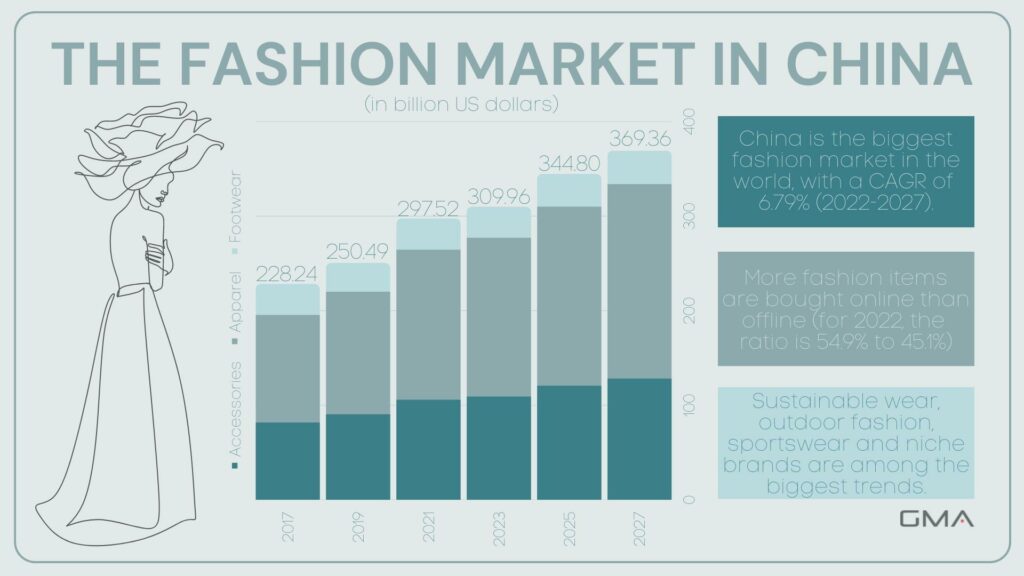
However, despite these changes, one thing that remains consistent is that Chinese consumers still refer to foreign brands using their Chinese names.
In a highly competitive market like China, foreign brands must adapt to the preferences of Chinese consumers in order to be more appealing and gain their trust. This includes using Chinese names and understanding the unique cultural context in order to connect with the target audience effectively.
Why is it important to have a Chinese name for your brand?

Chinese consumers are cautious when it comes to new fashion and luxury brands in China. They prefer well-established brands like Lancôme, Gucci, Louis Vuitton, and Chanel. If you’re planning to enter the Chinese market, it’s important to have a Chinese brand name and register your trademark as soon as possible.
Having a Chinese name shows your commitment to the Chinese market and your willingness to adapt to Chinese consumers. It’s the first step in your localized branding strategy and helps create a positive impression of your brand among Chinese consumers.
A Chinese brand name should reflect your brand’s values, story, and personality, tailored to Chinese culture, values, perceptions, habits, and expectations. The goal is to appeal to Chinese consumers and increase brand awareness.
How to come up with a Chinese name for your brand
‘Translating’ it phonetically
Be careful, by translating we do not mean that you should just translate it with any word that will come to you on Google translate!
It means that you should do market research, as well as semantic research about the meaning of each word, their connotation in China, their pronunciation (the same pronunciation can have different meanings!), and then look a the global meaning.
Don’t forget that your Chinese name should be unique and not similar to other already existing brands.
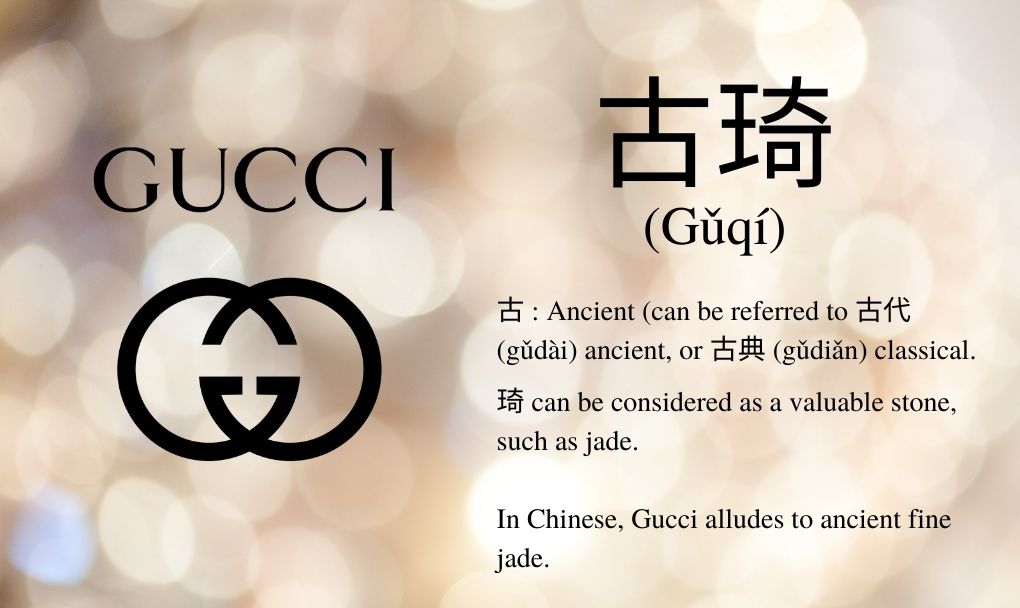
If we take the example of the luxury brand Gucci, we can see that its Chinese name was created phonetically.
Reflecting your brand’s attributes and values
It is not necessary to literally translate phonetically your brand into Chinese, but you can rather express the ideology of your brand through its Chinese name.
For example, the famous commercial center Carrefour is known as ‘家乐福’ (which can be translated as ‘happy home fortunate’) and uses of course only meliorative words. In China, you should avoid pejorative words at all costs!
Chinese consumers will not joke about that. Finally, be aware of intellectual property in China, look for information on the internet of work with dedicated specialists (you can contact us for more information).

Why is it a long process to create a Chinese brand?
The Chinese language is very rich, with over 20,000 words that can have different meanings. It is important to follow rules, restrictions, and semantic codes in China.
When creating a meaningful Chinese name for your brand, it should be easily understood by Chinese consumers and reflect your brand’s values. Sometimes, directly translating your brand may not be the best approach. Finding an appropriate and meaningful Chinese name takes time.
At GMA, our experts conduct in-depth market research on your industry, competitors, target consumers, and the meaning behind your brand. We analyze this data to adapt and translate it into Chinese, either phonetically or meaningfully, while considering the best combination of words in terms of meaning and fluidity.
We also ensure that the new Chinese name is unique and not already registered in China to avoid trademark infringement disputes.
Analysis of foreign brands and their Chinese name
Chanel: Known as 香奈儿 in China
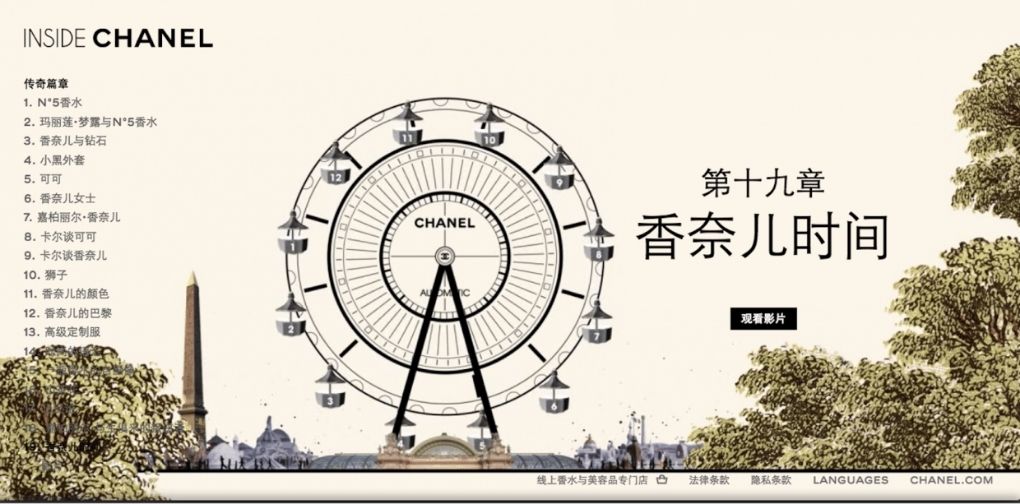
Chanel is always referred to as the best example for foreign brands that want to have a Chinese name. As a matter of fact, 香 (Xiang), which means “scented and aromatic”; 奈 (nai) which kind of have a similar phonetic sound to the original pronunciation of Chanel; the last character 儿 (Er) does not have an explicit meaning but usually implies a soft and feminine tone in Chinese.
All three characters combined have been able to successfully capture Chanel’s essence, as an elegant, exquisite, and high-end brand that only produces high-quality goods.
BMW: Known in China as 宝马
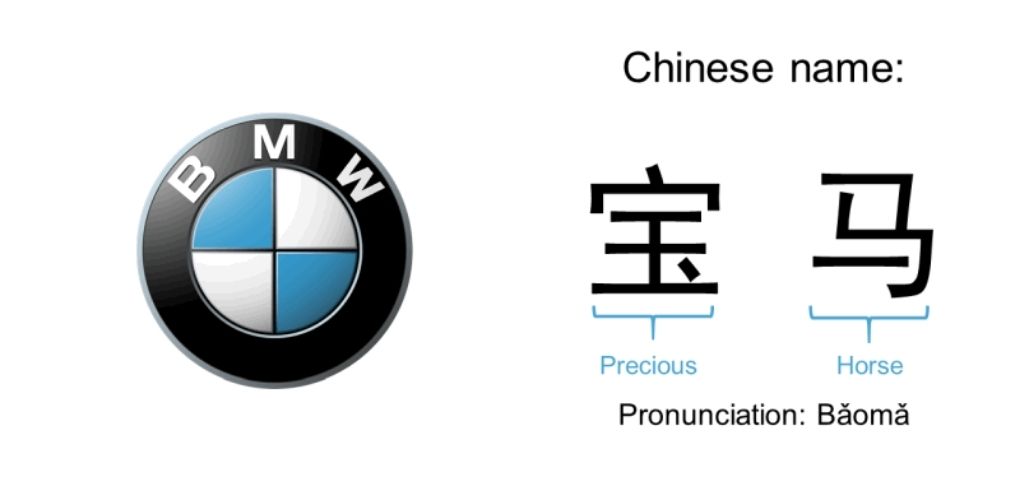
For example, BMW, one of the most popular and renowned car brands in China, decided to focus on several criteria to create its Chinese brand name. Indeed, commonly known as 宝马 (Bao Ma) in China, it has the same two first letters in its original acronym: the ‘B’ (that became Bao) and ‘M’ (Ma).
When looking deeper into the meaning of 宝马, which can be literally translated as ‘Treasured horse’, it is interesting to see that the car brand has considered both the automobile culture, with the ‘horsepower’, but also the Chinese culture.
As a matter of fact, Chinese history has long been considering the horse as an important symbol of freedom, speed, and boldness.
IKEA 宜家
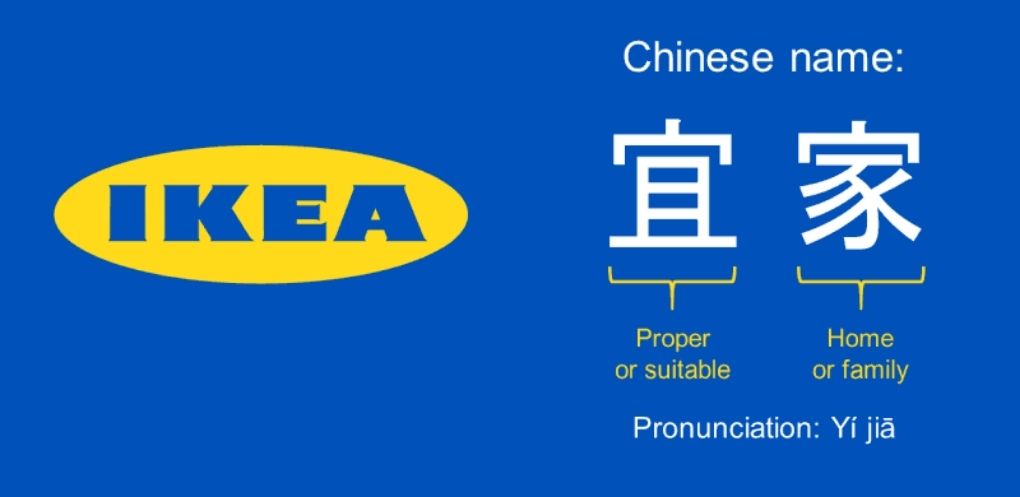
If we look at IKEA’s Chinese name, which is 宜家 (Yí jiā), the meaning of “proper home” or “suitable home” directly applies to IKEA’s values and goals.
That commitment to quality directly appeals to Chinese consumers that are looking to furnish their apartments. Moreover, it reflects a kind of practical approach of the Swedish brand into an easily understandable and pronounceable word.

On the other hand, we can also think of the word ‘一家’ which is pronounced the same way as IKEA’s Chinese name (Yijia).
This term can be translated as ‘the whole family, which is an extremely powerful way to attract Chinese consumers’ attention, as having a family in China is extremely important in terms of tradition. IKEA reunites the whole family, by providing high-quality goods for everyone.
Being unique is key in China
When establishing your Chinese brand, it is extremely important to take into account your competitors. You have to create a completely creative and unique name in order to distinguish yourself from competitors. Here are three reasons why you should have a unique name in China:
- If you have a memorable and unique Chinese brand name, Chinese consumers will keep it in mind more easily, and will directly associate it with specific products. It can also increase their curiosity to look for the meaning and purpose of your brand on social media and search engines.
- If you come up with a good Chinese name, you’ll be able to develop even more marketing strategies, increasing at the same time your reputation and brand awareness.
- A meaningful Chinese name will probably be effective as well, which will leave a good impression of your brand to Chinese consumers, adding brand appeal and stimulating their desire to try and purchase your products.
- It will allow you to rank more easily on Baidu in terms of SEO, as by having a unique name, there will be less competition and you’ll appear within the top results.
- By ranking at the top of search engines, people will be more likely to click on your website, which will increase as well your traffic.
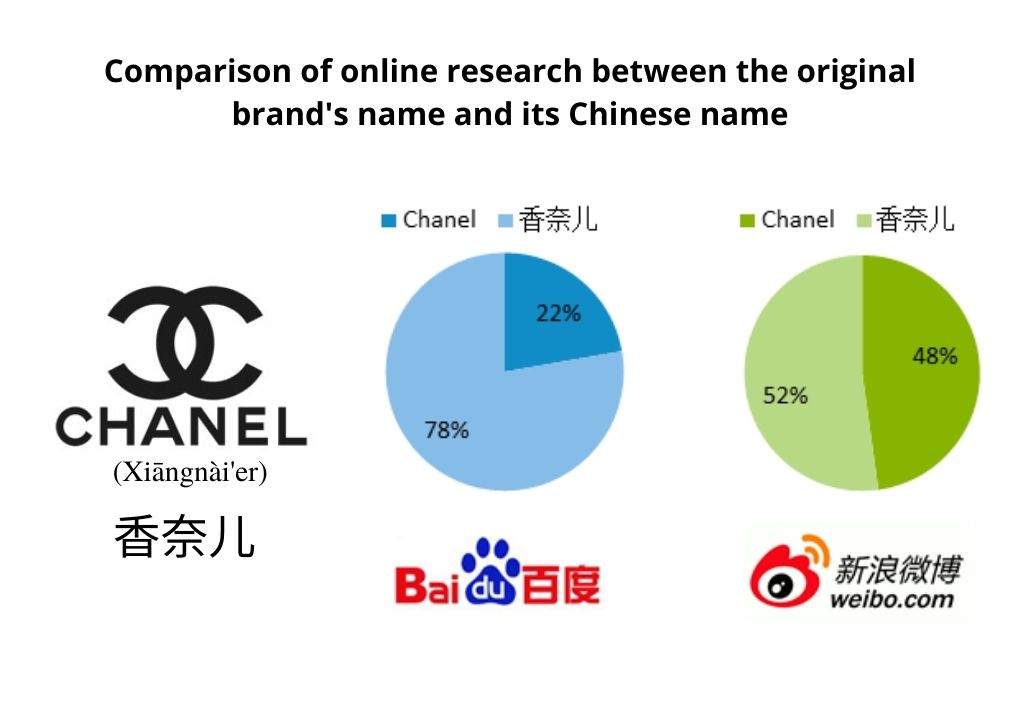
For example, if we look at the online research done on the top search engine Baidu, 78% of Chinese consumers are looking for Chanel by using its Chinese name, instead of just ‘Chanel’ on the search bar. The difference is not as important on Weibo, but the Chinese name is still predominant.
With Fashion and Luxury brands, it is even more important to stimulate Chinese consumers’ desire and encourage them to purchase your goods. Having a Chinese name can greatly contribute to your success among the Chinese population.
Register your Trademark in China

In China, it is important for companies to be aware of the differences in laws, intellectual properties, and trademarks compared to western countries. China operates on a “first-to-file” system, meaning that whoever registers a trademark first will have exclusive rights to sell and distribute the products associated with it.
Many companies have faced difficulties when another entity registers their trademark before them. Retrieving the trademark can be a complex and costly process. Therefore, it is strongly advised to register your trademark as soon as possible to ensure legal protection and stay ahead of competitors.
By registering your trademark, you will have full rights over your brand and products, allowing you to sell them legally in China.
What does ‘registering a trademark’ mean?
If you plan to enter the Chinese market, it is crucial to demonstrate that your brand will be unique in China. This means that you cannot register your company under an existing brand name, such as ‘Lancôme’. Your brand must be completely new and different from any other existing brands in China.
A notable example of a brand facing trademark issues in China is Muji, a Japanese brand. They did not register their trademark in China before selling their products, as they were mainly focused on planning their advertising and marketing campaigns.
However, another brand had already registered a similar trademark, ‘无印良品’ (Natural Mill), with the last three characters being identical to Muji’s Chinese brand name, ‘無印良品’. To avoid such unfortunate incidents, it is highly recommended to work with a specialized agency that can conduct market research beforehand.
This will help ensure that your brand name is unique and not already registered by another company in China.
Other examples of foreign brands that have a great Chinese name
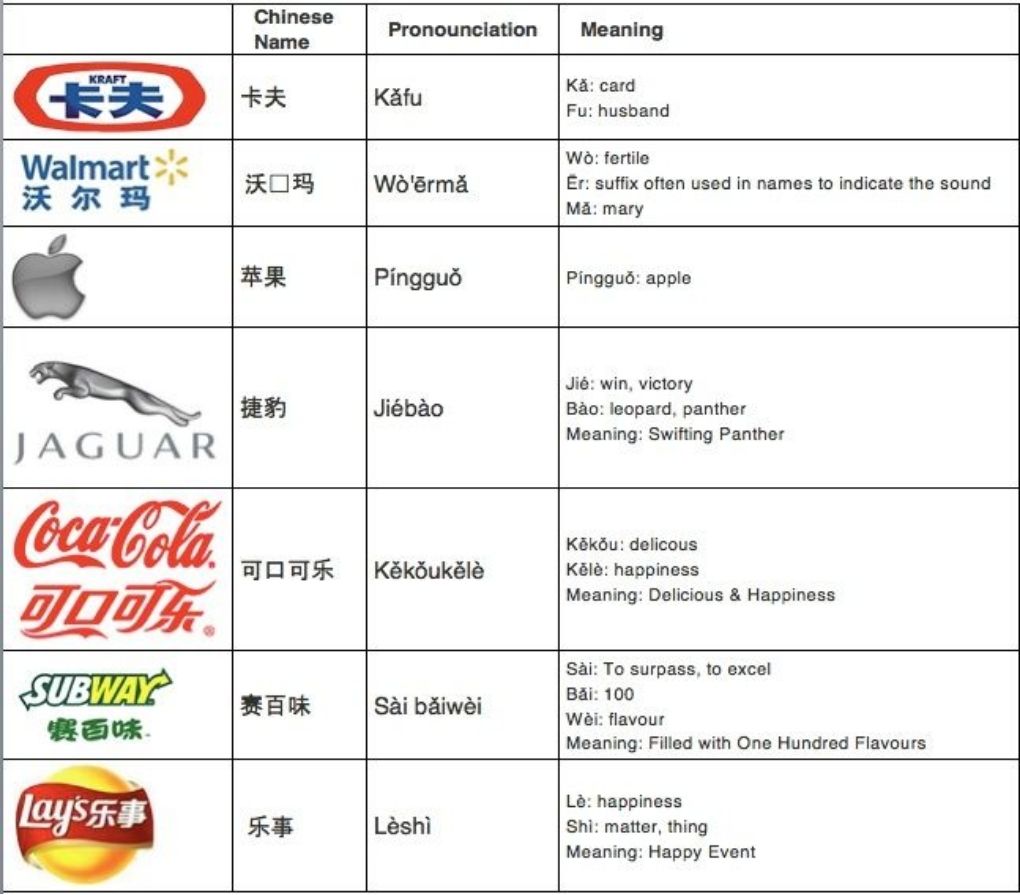
As you can see with these brands, they have been created using meliorative and positive words, and there’s also a link between the meaning and the services (such as Jaguar).
Contact us to Create your Chinese Brand Name
The Chinese market offers great opportunities for both smaller companies, such as startups, and larger international companies.
To succeed, it is important to adapt your brand to local consumers. Having a Chinese name can increase your visibility on social networks and generate word-of-mouth, which is crucial in China.

Working with a specialized agency is the best way to create your Chinese brand name
Creating a Chinese brand is a challenging process that involves extensive market research and a thorough understanding of the Chinese language. It is important to consider competitors who have already registered their trademarks in China.
To create a Chinese brand name, linguistic experts can assist in determining the best approach based on various criteria, which will be discussed and determined in collaboration with our experts.
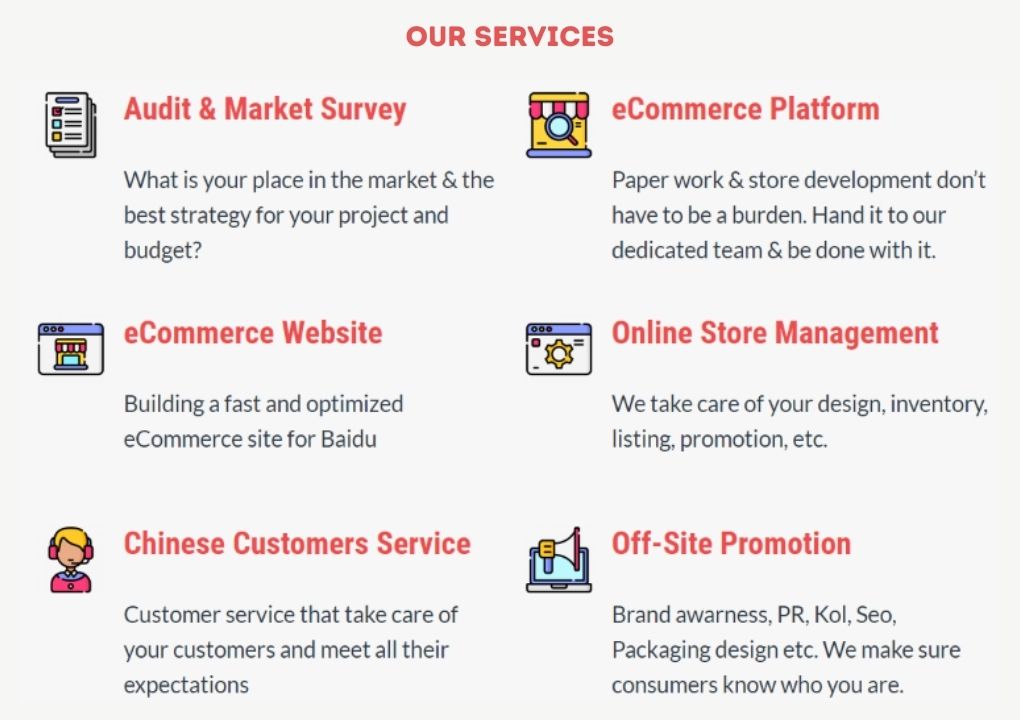
Why should you choose GMA to create your Chinese brand name?
We specialize in helping foreign brands create their own Chinese brand names that adhere to Chinese standards. Our team consists of international and native experts who understand the nuances of the Chinese language and the rules for creating Chinese names.
With our brand naming services, we aim to assist you in smoothly entering the Chinese market while effectively conveying your brand’s value and characteristics to Chinese consumers. Our experts can provide you with more details regarding the meaning and pronunciation of your chosen name.
Additionally, we can assist with trademark registration in China. If you have any specific questions about creating your Chinese brand name, registering your trademark, entering the Chinese market, or any other inquiries, please don’t hesitate to contact us. Our experts will respond within 24 hours.
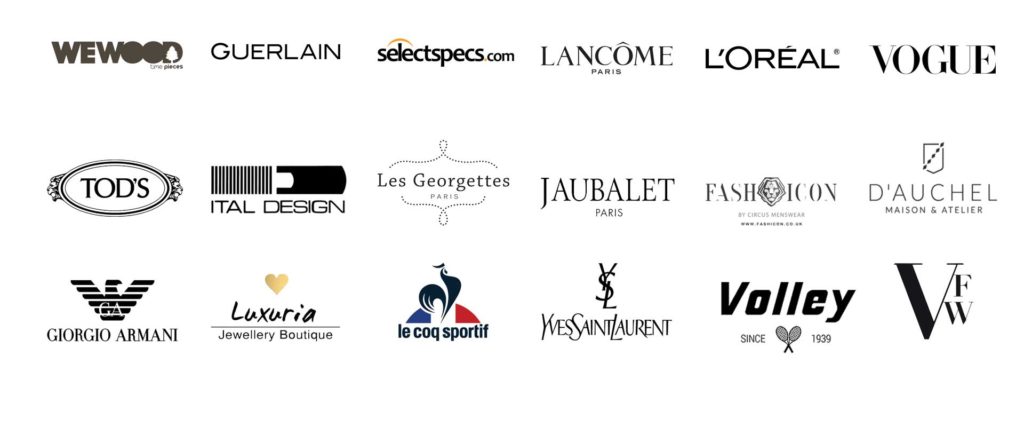

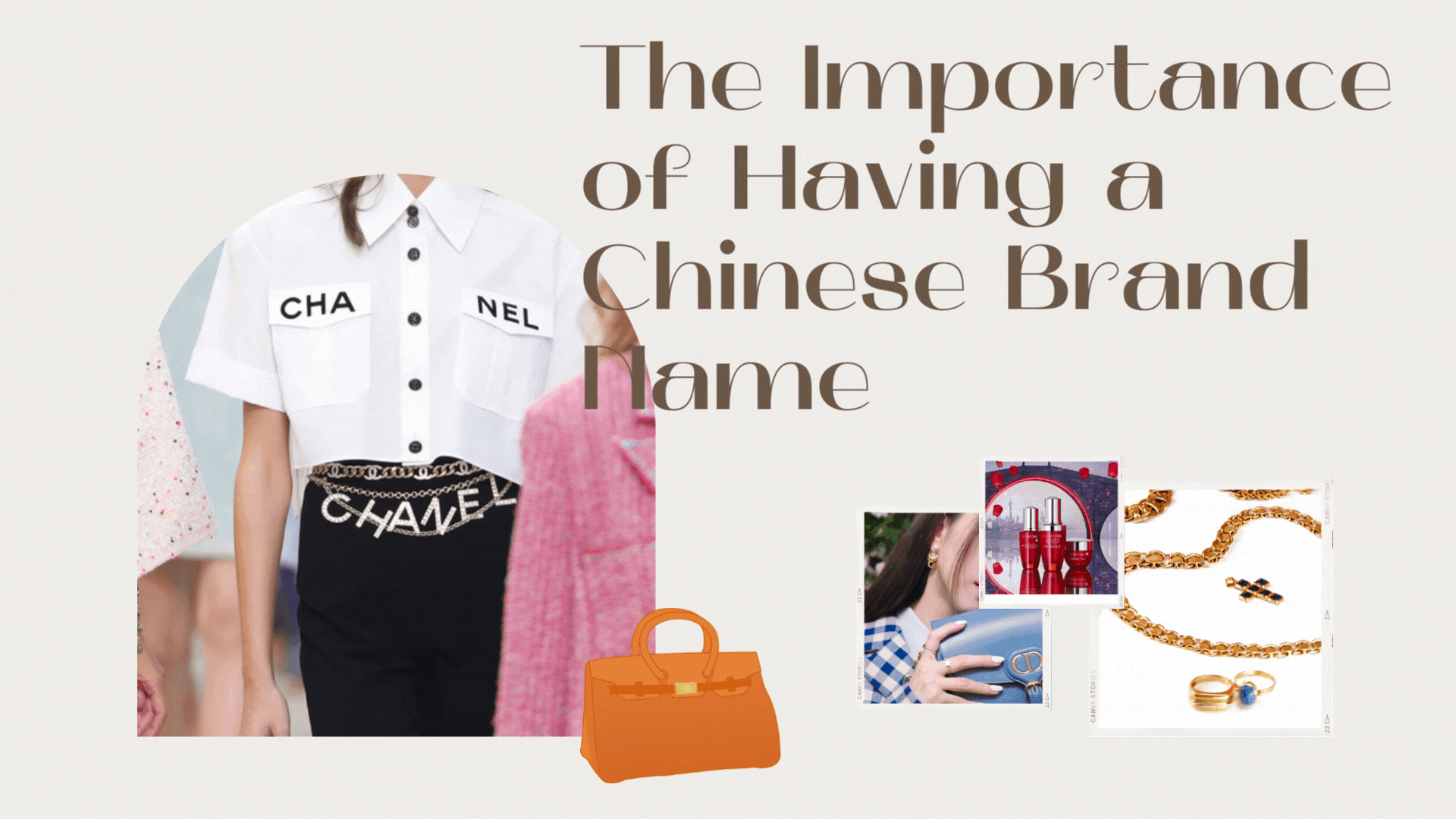
1 comment
Petra Bonnekamp
Hello,
I’m working for the German pharmaceutical consumer brand Merz Spezial. We’re currently looking for an agency to create our Chinese brand name.
Would you please get back to me with a quotation?
Thank you & best regards,
Petra